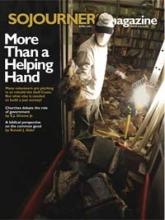When it comes to figuring out the appropriate role of the government in addressing our most pressing social ills, opinions among people of faith cross the spectrum: Some say government should play a central role; others believe it should be limited, leaving space for nonprofits, businesses, philanthropists, and churches to come up with solutions. There's also a vast middle ground, where public and private partnerships of all flavors can be effective tools for social change. Yes, there are real disagreements over theology, vision, and ways of implementing programs, but real solutions are within reach. In this month's cover package, Washington Post columnist and Brookings Institution scholar E.J. Dionne examines the debate around these issues, Ron Sider offers a biblical perspective on government's proper role, and our staff writers look closely at four aspects of the common good as case studies: poverty, the environment, public health, and obstacles to disaster relief. What are the elements required in building a more-just society? This question has occupied the core of Vincent Harding's life and work. The eminent civil rights leader and longtime friend of Sojourners stopped by for a visit to our office last fall and sat down for a chat with associate editor Rose Marie Berger. Harding's faithful, justice-seeking work alongside Martin Luther King Jr. and others in the movement is instructive and inspiring for all those engaged, as King put it, in the "long and bitter, but beautiful, struggle for a new world." We are grateful to the Annie E. Casey Foundation, which provided funding for this expanded issue. The findings and conclusions presented do not necessarily reflect the opinions of the Casey Foundation. ?The Editors
Read the Full Article

Already a subscriber? Login